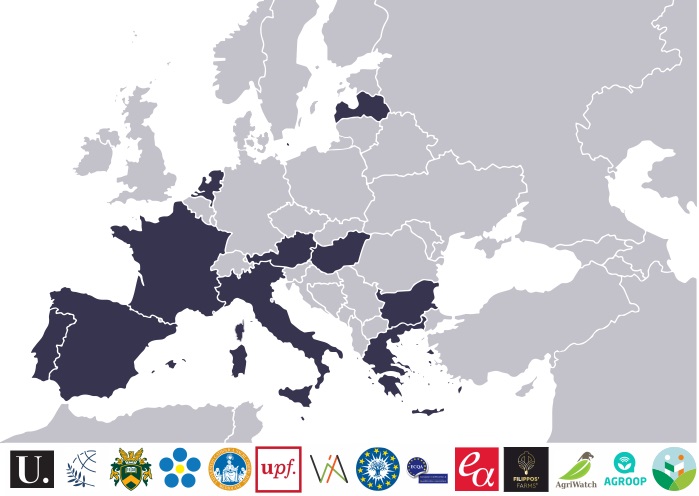UPF is participating in a European project to train future generations in smart agriculture
The TERRATECH project, involving fourteen partners from academia, agriculture and technology in ten European countries, will develop an advanced interactive master’s degree in smart agricultural technologies. As part of the master’s degree, the Wireless Networking Research Group of the UPF Department of Information and Communication Technologies will design and teach an online course on wireless sensor networks.

UPF, through the Wireless Networking Research Group of the Department of Information and Communication Technologies (DTIC), is one of the entities belonging to TERRATECH (masTERs course on smArt Agriculture TECHnologies), a project funded by the ERASMUS+ programme of the European Commission, which will develop an advanced interactive master’s degree focusing on Internet of Things (IoT) applications in agriculture.
The master’s degree, for which teaching will start in the 2022-2023 academic year, will train in the skills and knowledge needed to work in the growing smart and precision agriculture industry.
Over the years, agriculture has evolved hugely, driven by new scientific knowledge and consequent technological developments. Precision agriculture is among the most recent advances in this sector: it consists of using the latest technology to monitor crops and environmental conditions in real time, with the aim of improving management decisions that allow boosting crop productivity and sustainability in adverse environmental conditions.
Its growing popularity among farmers, together with the growing market demand, has brought about the need to train professionals with experience in both agriculture and Internet of Things (IoT) engineering. To meet this demand, the master’s degree driven by TERRATECH, for which teaching will start in the 2022-2023 academic year, will train in the skills and knowledge needed to work in the growing smart and precision agriculture industry.
What will the advanced interactive master’s degree be like and what competences will graduates have?
The innovative curriculum consists of interactive teaching methods and collaborations with agricultural associations and companies capable of providing engineering-based technical solutions. It will provide students with solid theoretical and practical training, enabling them to embark on a successful career in the emerging field of smart precision agriculture.
The duration of the master’s degree, under the ECTS credit standards for recognition throughout the European Union, will be eight months, to which a month’s training experience within the collaborating companies will be added. During the course, two mobility periods will allow students and collaborators to meet in large-scale laboratories, which will provide participants with crucial practical experience.
During the course, two mobility periods will allow students and collaborators to meet in large-scale laboratories, which will provide participants with crucial practical experience
Students who complete the master’s degree will be able to use new technologies in the field of agriculture including sensors, positioning technologies, new data analysis tools, advanced networks through the Internet of Things (IoT), and machine-to-machine (M2M) communication.
These technologies will allow real-time monitoring of the physical parameters of the crop field, local weather conditions and precise control of irrigation, fertilization and pest diagnosis through automation.
The master’s degree will provide the European labour market with technicians capable of incorporating technologies into agricultural production systems, developing new solutions adapted to the needs of farmers, as well as new entrepreneurial ideas for the creation of agribusinesses.
The course that will be designed by the UPF Wireless Networking Research Group
Within the master’s degree, the course that will be designed and taught by the DTIC’s Wireless Networking Research Group, coordinated by Boris Bellalta, will consist of thirty hours of online training on wireless sensor networks. Titled “Remote Sensing and Wireless Sensor Networks”, it will prepare students to understand and operate such networks, as well as the design and development of tailor-made solutions to specific problems.
The UPF course will prepare students to understand and operate such networks, as well as the design and development of tailor-made solutions to specific problems
This course, which is expected to be launched in the autumn of 2022, will cover all areas of these systems. It will provide an overview of positioning as an external reference and principles of data acquisition and processing and will include topics such as sensor network architecture, software applications, hardware platforms, physical layer techniques, medium access control, topology control, service quality management and storage, among other aspects.
Moreover, in December 2021, the Wireless Networking Research Group will organize an online workshop on the project.
The entities belonging to the TERRATECH project consortium
In addition to UPF, the other five academic institutions that belong to the project are the University of Porto, Portugal (project coordinator), University of Debrecen (Hungary), International Hellenic University (Greece), Vidzeme University of Applied Sciences (Latvia), and Catholic University of the Sacred Heart (Italy).
The rest of the consortium is made up of five SMEs (Cerca Trova Ltd., Bulgaria; ECQA GmbH, Austria; Evolutionary Archetypes Consulting SL, Spain; AgriWatch, Netherlands, and Agroop, Portugal); a research centre (Mediterranean Agronomic Institute of Chania, Greece), an agricultural cooperative (Western France Regional Federation of CUMA, France), and an agricultural enterprise (Ktima Filippou-Schoinoplokakis, Greece).

